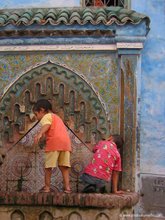 I have read that one of the many meanings of the word Shari'a is 'the path to the watering hole'. I am not a linguist nor an Arabic speaker, so I cannot say if there is truth in this, but I like it anyway. By following the Shari'a we travel towards the Source of all things, we travel towards God. But the question that is always in my mind is how do we do so? What does it mean to follow the Shari'a? Is there only one path? Islam as we know, is the 'Straight Path' but how clearly defined is it, how do we know when we remain on the right track?
I have read that one of the many meanings of the word Shari'a is 'the path to the watering hole'. I am not a linguist nor an Arabic speaker, so I cannot say if there is truth in this, but I like it anyway. By following the Shari'a we travel towards the Source of all things, we travel towards God. But the question that is always in my mind is how do we do so? What does it mean to follow the Shari'a? Is there only one path? Islam as we know, is the 'Straight Path' but how clearly defined is it, how do we know when we remain on the right track?I have never been a person suited to black and white critiques of the world. My personal experience and intuition have shown me that in most situations there are many 'shades of grey'. To view reality in terms of opposites seems to me a gross oversimplification and a crude attempt to translate the vastness of Allahs swt creation into something tangible and tame. But the fact remains that if there is a 'path' that we have to follow, then we do have to make attempts to discern what Allah swt intends this path to be. This is a task too great for those who are not equipped with the right knowledge. This is not to say that the Qu'ran cannot 'speak' to us directly, but we cannot take this direct knowledge and formulate it into tafsir without the necessary qualifications.
So what exactly are these qualifications? What makes an Islamic scholar? There are all the usual things such as extensive knowledge of Fusha Arabic, knowledge of hadith, seerah etc but there are also things less easily measurable such as the proficiency to absorb sacred knowledge, taqwa and having a pure heart. I once asked a friends husband whether he thought todays scholars were at the same standard as the great Imams of the past. I wasn't surprised that he said 'No' but his explanation I found very interesting as no one had expressed things this way to me before. He said that it wasn't just formal knowledge that was passed from teacher to student but baraka as well. He said that it is this baraka that is missing in the present time. He felt that in the earlier generations this baraka was evident in everything. He also said that whilst in this current time we do have very knowledgable men and women, they do not possess the breadth of knowledge of the scholars of the earlier generations. That is, someone may have a vast knowledge of hadith but their understanding of fusha may be lacking, etc. So where does this leave us?
Of course many people say that the gates of Ijtihaad are almost closed, that decisions have been made about all things except new matters that were not known by the early scholars. I am very uncomfortable with this premise because although these scholars were men of exceptional intelligence and faith, they were still human beings and most human beings do not possess the capability to transcend the culture and time in which they are living. They are men after all and men are not perfect...and this is my second dissatisfaction with adhering to the traditional perspective, where is the female voice?
So how can I traverse the path to the watering hole when I am unsure about what form this path takes? My position so far has been to adhere to a traditional understanding of Islam simply because I don't see an alternative that I can trust at this current time, but I have dissatisfactions. The thing that I try to focus on is 'holding onto the rope of Allah swt' and I understand this to be tawhid. May Allah swt guide all of us to his Straight Path and make truth clear from falsehood.

No comments:
Post a Comment